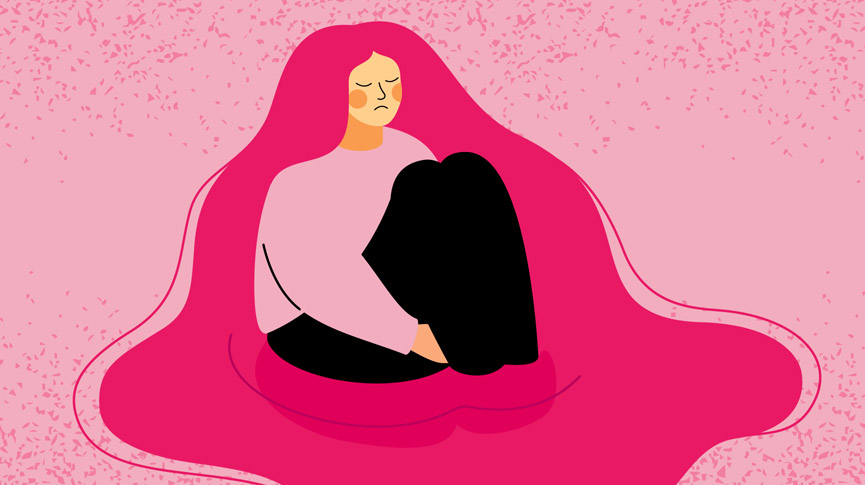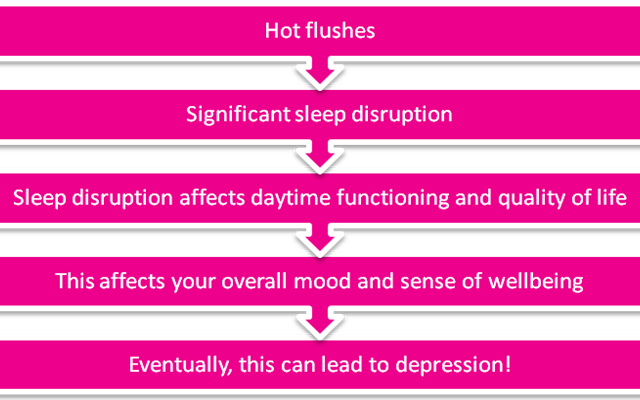Menopause and Depression – More Than Just a Mood Swing

More than just a simple mood swing, the link between menopause and depression is no myth. This link has been convincingly demonstrated in the Harvard Study of Moods and Cycles that showed that women faced a higher likelihood of developing depression as they entered menopause. It is estimated that 1.3 million women reach menopause annually in the US and of these, 20% will experience depression at some point during this phase.
What is depression?
Depression is a medical condition that is characterized by feelings of sadness, hopelessness and helplessness and can range from mild to severe. While its cause can range from complex genetics (where you inherit the condition from someone in your family line) to just plain stress; in this post, we will focus on another more unique cause of depression – menopause. It is important that you understand how depression in menopause can occur, recognize the signs, and never hesitate to seek medical and/or professional advice on how to deal with it.
The link between menopause and depression
Estrogen plays an important role in regulating the hypothalamus in the brain. The hypothalamus is the part of your brain that controls a variety of physiological and behavioral functions such as body temperature, hunger, thirst, fatigue, sleep and certain social behaviors.
During menopause, the abrupt changes (and eventual reduction) in estrogen levels directly impacts the hypothalamus resulting in the physiological and mood changes commonly observed in menopause. This is linked to an increased risk of depression during menopause.
Menopause, a time of change
Additionally, one should bear in mind that the age at that menopause occurs is also a time of many life changes, such as your children moving out or going to college, retirement, and general mid-life crisis. The physical changes that you go through at menopause can also affect how you feel about yourself. These are all contributing factors which may lead to depression during menopause.
Hot flushes can lead to depression too
To date, there is also believed to be a direct link between hot flushes and depression. Known as the “Domino Theory”, this is a breakdown of how it works:
For more information on dealing with hot flushes click here.
The following are some of the key symptoms of depression
- A nagging feeling of sadness or anxiety
- Loss of interest in activities which you used to enjoy, including sex
- Feelings of restlessness or constant irritability
- Frequent crying or busting into tears at the slightest triggers
- Feelings of guilt, helplessness or general pessimism
- Lethargy, to the point of not being able to get out of bed, or excessive sleeping
- Major change in weight (gain or loss)
- Difficulty concentrating
- Suicidal thoughts
If you are experiencing a few or all of the above symptoms, it is best to approach your doctor for more information to better understand what you might be going through during this phase.
Depression is a condition which only a healthcare professional can diagnose you with after reviewing your symptoms, medical and family history, physical condition and even laboratory test results. So don’t worry if you’re feeling down sometimes, it could just be a bad day, not clinical depression!
Fortunately, the advancements in medicine today means there is now a lot more understanding about the condition both in terms of causes as well as management strategies. As such, many people who have been diagnosed with depression are not only able to get on with their daily lives, but also recover from the condition altogether.
Coping with the symptoms
Depression in menopause is manageable and it is important to seek help from your doctor early if you experience any of the symptoms. If needed, your doctor may prescribe medications such as antidepressants and psychotherapy. It is also important that your friends and family understand what you are going through and are able to provide the adequate emotional support so you don’t have to go through this challenging time alone.
Here are some useful tips which may help you cope with depression:
- Take steps to relieve hot flushes! Chose loose, layered clothing in breathable and comfortable materials, or look up herbal remedies such as flaxseed which has been shown to be effective in reducing hot flushes
- Keep your bedroom well-ventilated and comfortable to help prevent interrupted sleep
- Eat healthy and maintain an active lifestyle
- Engage in a creative outlet or get a hobby that fosters a sense of achievement, such as painting, baking, or writing
- Practice a self-calming activity such as yoga, meditation or tai chi
- Don’t push people away. Stay connected with your friends and family as they can help provide the support you need
- Speak to your doctor to better understand how certain medications and supplements can help you through this phase
Many women transition to menopause without experiencing depression. For those who do however, you are not alone! Remember, every woman is unique and we are all affected by menopause differently.

A collective group of “lady experts” at Intimina who love sharing our personal experiences, even when they are a little too personal. We believe it’s time to start breaking down the taboos around menstruation, motherhood, and menopause, and start owning our female health.




I’ve been in menopause for two years and I had a few symptoms like hot flashes and low libido. Just recently I started feeling depressed. I cannot shake this feeling and I feel nobody understands me. I’m glad I ran across this website because it has shedded some light on my situation. Thanks for giving me a platform, it has helped more than you will every know.
Hi Monique,
thank you for the kind words, we are here to help (chat or answer all your questions)
Have a great day,
Felt fed up, depressed, so tired for last four years.😫
Is this depression or us this memopause?
It is hard to tell, I am very moody, angry easily, and cross with everyone. I hate everybody. don’t wanna talk to anyone at the moment. I cannot sleep well or sleep too much..